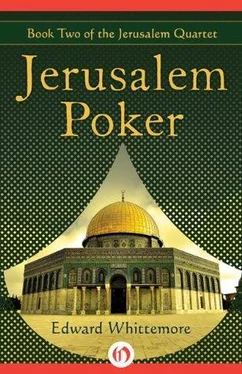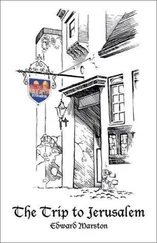But finally home. Nubar lurched for the landing and nearly missed it, lost a shoe and his top hat in the water, lost his opera cape on the landing, muttered incoherently as he staggered across the wet stones pulling off his clothes and disappeared at last, mostly naked, through the door of his elegant palazzo, there to hide until night came once more to cover his movements.
Thus lived Nubar in the closing days of 1933, a crazed phantom figure haunting the winter mists of Venice, never farther from the eternal city of his dreams. Yet soon now, very soon, to achieve his goal of immortality after reading the UIA's last staggering report on the Great Jerusalem Poker Game.
— 12-
Maud
Afraid of Jerusalem, just imagine. Afraid of something, unlike the rest of us.
Not surprisingly, Maud's long friendship with Munk began in Smyrna. Many years later when she looked back on her four decades in the Eastern Mediterranean, it was one of the two cities that meant the most to her, Smyrna in her mind somehow embodying the secrets of profane love just as Jerusalem held the secrets of more sacred dreams.
In fact Maud lived only briefly in each of them, about half a year in Smyrna and a little more in Jerusalem.
Yet so changeable was the flow of time for her in retrospect, reducing whole years to a few experiences dimly recollected, surging elsewhere to transform an afternoon or an evening into months of memories, that the importance of those two cities in her life far surpassed the actual decades spent in Athens and Istanbul and Cairo.
Jerusalem, because she met Joe there. Smyrna, because of Sivi and Theresa.
Munk she met in the one, but she always associated him with the other.
Smyrna, then, in 1921. Maud in flight from the little flowered house in Jericho that Joe had so lovingly found for her so she could escape the wintry blasts sweeping the heights above. The child she was awaiting had been conceived the previous spring in their first days and nights of love in a tiny oasis on the shores of the Gulf of Aqaba. One month of exquisite solitude in that tiny oasis, one boundless month in a world of fiery desert sunsets and star-filled darkness, of sun-soaked hours on the brilliant sands, lacing the Sinai and the blue cooling water in the fingers of their love.
Winter in another oasis after that, in flowering Jericho awaiting the birth of their child, Joe away most of the time smuggling arms because he could find no other way to make a living for them as a fugitive in Palestine, away because he had to be, yet Maud's old fears of being abandoned returning from her childhood, asking those terrible questions from childhood.
Why did everyone leave? Why did they go away?
As her card-playing father had done when he left the farm in Pennsylvania to go west. As her mother had done when she swallowed Paris green in despair, and when that failed went out to the barn and hanged herself at supper-time. As her Cheyenne grandmother had done behind the counter of the grimy saloon she ran in a Pennsylvania mining town, the old Indian woman hardly saying a word for days on end as little Maud learned arithmetic by adding up what the miners drank, hearing from them that her grandfather was a convicted murderer who had been sent away, never to return.
And then the dream of her youth, to become the best figure skater in the world, which she still might have become when she escaped to Europe at the age of sixteen as the youngest member of the Olympic skating team. But instead, being totally ignorant of men, she had made the disastrous romantic mistake of marrying a man she knew not at all, a man who lived in a seventeenth-century Albanian castle, the depraved Catherine Wallenstein.
Catherine raging insanely between the twin curses placed upon him by his father, the last of the Skanderbeg Wallensteins, who had come to think he was God and that his son was therefore Christ, who had named his son after the monastery in the Sinai where he had discovered the original Bible, twin unbearable burdens for Catherine Wallenstein, hopelessly lost as he staggered ever deeper into the symbols attributed to St Catherine, a sword and a crown and a wheel and a book, using a wheel to torture boys in the Albanian forests and a sword to kill them slowly as he bled from a crown of thorns and covered the book of his short violent life with sacrificial human skin, in savage madness reenacting on others the martyrdom of the historical Catherine and her mystical marriage to Christ.
Fated from the beginning, Catherine Wallenstein. Doomed by an intolerably pious act in the last century, his father's forgery of the original Bible, a stupendous task meant to bring order out of chaos and give grounds for faith where there were none.
Maud saved from him by the intercession of a mysterious old woman who had a strange hold over the castle, Sophia the Unspoken, at the time not known to be Catherine's mother, who helped Maud flee the castle in 1906 when her time was coming to give birth to Catherine's child, which Maud did prematurely in a peasant farmhouse, Catherine in pursuit with forty horsemen finding the farmhouse where she lay and slaughtering all the inhabitants before ordering some of his party to carry his newborn son back to the castle, Catherine himself galloping on ahead intending to murder Sophia, who instead at last brought an end to the curses on her son by striking him dead on the road in front of the castle. With her eyes, as she thought, and by making the sign of the cross.
Maud's Wallenstein son, Nubar, thus lost to her on the day of his birth. And seven years later in Athens an infant daughter dead while her second husband, the Greek patriot Yanni, was away fighting in one of his wars, Yanni himself dead in 1916 on the Macedonian front.
After four long years of sadness a dream in Jerusalem, where she met her magical Irishman just as he was emerging for the first time from Haj Harun's mysterious caverns of the past, Joe all whirling words and visions in the shadowy crypt of the Church of the Holy Sepulchre, Maud in wonder and silence slipping to her knees and performing a first wordless act of Communion there.
To be followed by beautiful Aqaba in the spring, the worn stones of Jerusalem in the summer and flowering Jericho in the autumn when the evenings were turning cold on the heights. And Joe away although he couldn't help it, and the terrible fear tormenting Maud as she gazed into the currents of the Jordan flowing near their little house, the muddy river of miracles by then reaching the end of its brief and steeply falling course from the rich slopes of Galilee down to the utter barrenness of the Dead Sea.
Fear that Joe would leave her. That this love would also go away. At her feet a rushing river and Joe too young to understand the terrified silences that gripped her that winter beside the Jordan, Maud unable to raise her eyes from the water and reach out and touch the man she loved.
So she had run away from the little house where Bernini was born toward the end of winter. She had left before Joe had even seen his son, not leaving a note behind for him because there was no way then that she could explain her dreaded memories of a barn in Pennsylvania and a castle in Albania, a daughter dying when Yanni was away at the front and Yanni's death, all those restless demons that had returned to shatter the dream of peace she thought she had found in the stillness of a crypt in Jerusalem.
Abandoning the little flowered house in desperation and going up to Galilee, where she rested until she could travel with Bernini. And then in April sadly journeying on to the only sanctuary she knew in the world, the lovely villa by the sea in Smyrna that was the home of Yanni's elderly half-brother, the elegant and kindly Sivi.
Читать дальше












